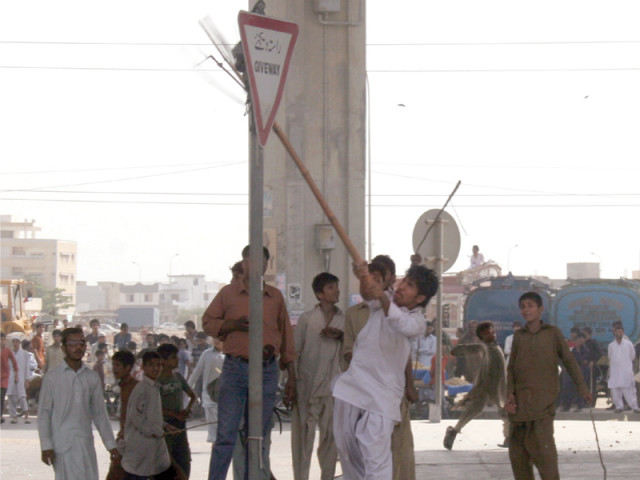Urban drought: Qayyumabad residents lose it after 15 days without water
The protesters pelted passing vehicles with stones and urged others to join in.

Frustrated by having to go without water for days on end, the residents of Qayyumabad stormed out on Tuesday, blocked traffic and pelted passing vehicles with stones for almost two hours.
The areas worst affected by the water shortage are Qayyumabad, DHA, Landhi and Korangi, including its industrial estates. People across the city have been complaining about water scarcity as the water board and Karachi Electric Supply Company continue to haggle over unpaid bills by the board.
At the protest, young men showed off hand guns and held sticks. They even abused and kicked the people who tried to use the KPT flyover and adjacent roads to escape the rioting.
“Are you not facing the crisis?” shouted one teenager at a driver who tried to drive through the blockade. “If you are, then switch off the engine and join us in protest.”
According to another protester, Azam, Karachi Water and Sewerage Board (KWSB) discontinued water supply around 14 days ago. “You don’t know what we have been going through,” he said. “And when the supply was restored this morning there was no electricity to pump it to the overhead tanks!”
The people stranded on the road waited helplessly for the police. It took the police two hours and firing in the air, to disperse the protesters.
Predictions come true
A month ago, while talking to The Express Tribune, the managing director of KWSB, Misbahuddin Farid had predicted that the shortage will cause the people to take to the streets.
“They want riots,” he had said. “They want people to come out on the streets and protest.”
But at the same time, some have pointed fingers at him for exploiting the shortage and cutting down supply to industrial estates. The senior and retired engineers of KWSB reason that even if electricity is disconnected for a few hours at Dhabeji, it is impossible that all the water in the entire pipeline network drains in a few hours, leaving some areas like Qayyumabad without water for a fortnight.
According to them, exploiting the situation would put pressure on KESC who will restore water supply to the board, without receiving the pending dues. Its effect was visible on Tuesday as several newspapers carried advertisements from estate owners, begging the president of Pakistan to resolve the matter.
According to the general secretary of Karachi Water Tanker Owners Welfare Association, Hazoor Khan, 200 subsoil hydrants were shut down since February on Farid’s orders. “These hydrants supplied nearly 10 million gallons per day to industries. At least 40 per cent of them depended on subsoil water,” he said. “Look at the timing. First the hydrants shut down and now piped water supply is cut off.”
Toeing the line?
But the deputy commissioner of Karachi South, Jamal Mustafa Qazi, who is looking into the cause of water scarcity, ruled out any move on the part of KWSB to deliberately enhance the water shortage.
He said that KESC cut off power to the pumping stations for more than just five hours. “On one instance, Dhabeji had no electricity for two days,” he said. “The heavy duty water pumps are huge and take at least 12 hours to start working properly after power is restored.”
However, Qazi said, according to an agreement signed between the KESC and the government, the power supply to Dhabeji can’t be disconnected because it is listed as a strategic asset, along with the installations of armed forces. KESC can’t shed their load here without the government’s permission.
The deputy commissioner said that KWSB operated as a not-for-profit organisation. “Imagine if the board began charging people commercially. There will be chaos everywhere.”
Just like KESC faces power theft, KWSB also struggles to recover water bills from the people.
Published in The Express Tribune, April 18th, 2012.


















COMMENTS
Comments are moderated and generally will be posted if they are on-topic and not abusive.
For more information, please see our Comments FAQ